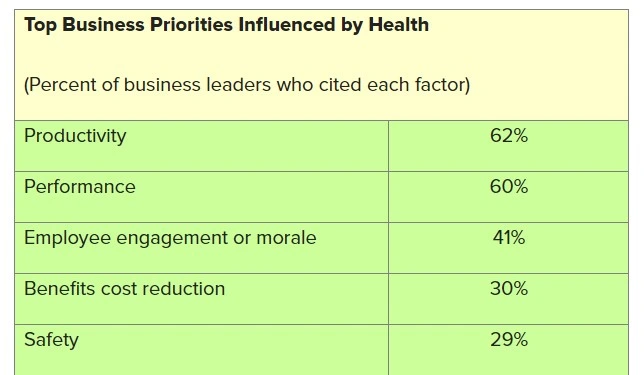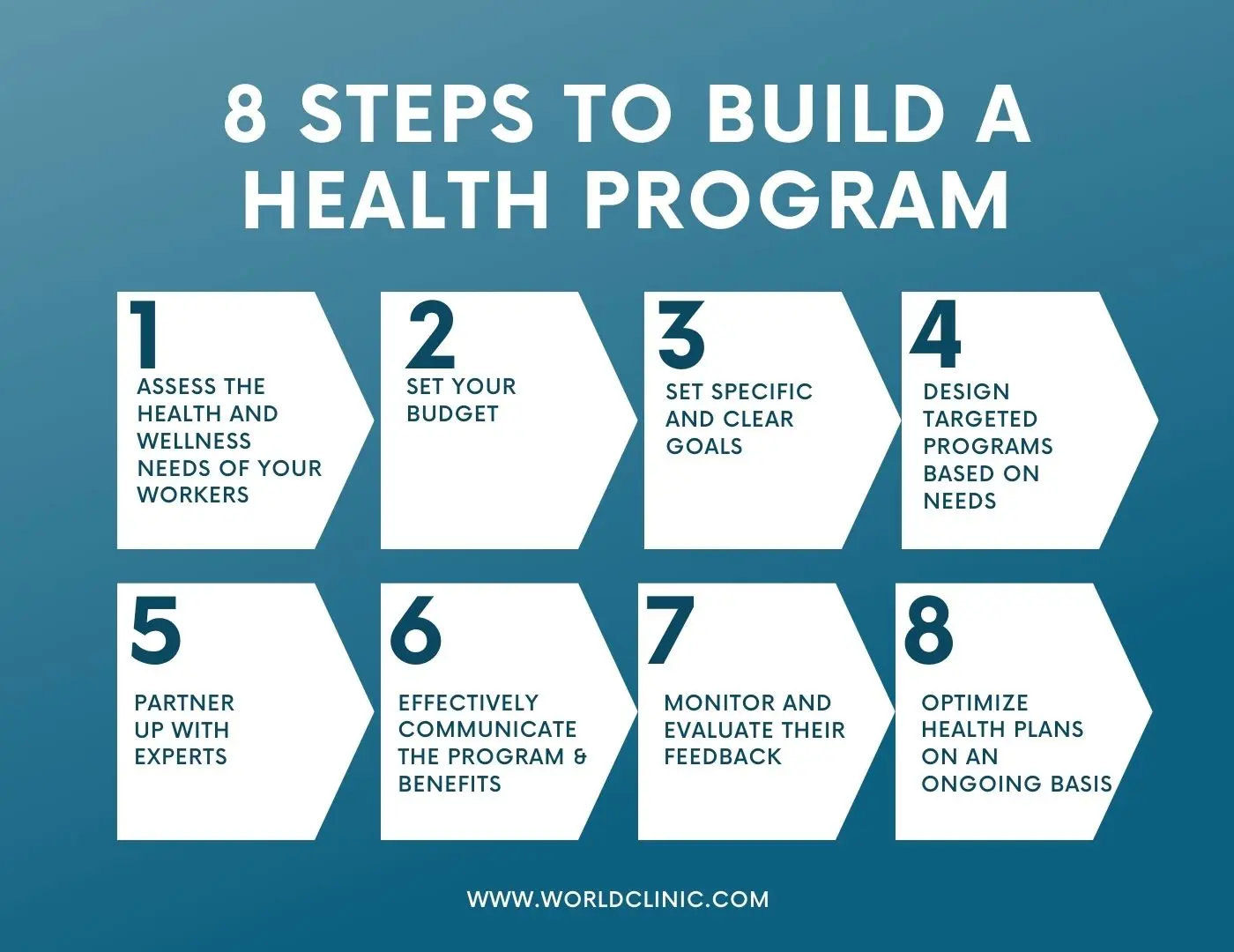62% of business leaders believe that health has a direct impact on employee productivity. As you can tell, offering your workers corporate health programs is simply good for business.
Corporate health goes beyond traditional employee health benefits and insurance. It also covers strategies that can help you improve the well-being of your workers and simultaneously drive success in your organization.
Along with physical wellness, corporate health programs are meant to cover mental and emotional health support. This aid aims to make your workers more productive and create a positive culture at work.
Going a step beyond, advanced corporate health plans are most beneficial to executives and corporate leaders, especially if coupled with executive concierge medicine. But what are these programs and how do they work?
In this guide, we’ll tell you all about corporate health, why it’s worth the investment, the benefits it offers to employers and employees, and more. Let’s get started.
What is Corporate Health?
Corporate health refers to all the efforts your organization makes to keep your workers healthy physically, mentally, and emotionally. It goes beyond traditional medical coverage and includes proactive healthcare with regular checkups, continuity of care, and even chronic illness management.
The main goal of corporate health programs is to create an environment where your employees feel supported in their health and well-being, which in turn improves the overall performance of your organization.
As opposed to basic employer sponsored health insurance, corporate health focuses on a proactive, integrated approach that directly helps you reduce turnover and increase your employee satisfaction at work. This is just the tip of the iceberg when it comes to corporate health care.

Key Components of Corporate Health
Corporate health programs come in different shapes and sizes. Some cover basic annual executive physicals, while others go a couple of steps forward and provide preventive healthcare that includes everything from mental health support to 24/7 global access.
Successful health and wellness corporate programs will usually cover the following:
Proactive and preventive care
Instead of treating symptoms as they come up, corporate health programs focus on preventing potential health issues. Preventive care offers numerous benefits. For instance, these programs utilize routine screenings, flu vaccinations, and wellness workshops to identify illnesses early, enabling treatment before they escalate into more significant problems..
Health risk assessments
Building upon the proactive nature of corporate health, these programs also include health risk assessments. With extensive evaluations, corporate health providers can identify potential health risks in your workforce to help you build targeted health programs around the Achilles’ heel of your employees.
Tailored health packages
If you make the extra effort and offer corporate health programs to your workers, you’ll have health packages that are tailored to the specific needs of your workforce.
For example, they’ll vary from role to role. Your executives will get concierge services with 24/7 global access in case they encounter a health issue while traveling. Overall, health packages can be custom-built for employees at all levels.
Mental health support
Last but not least, corporate health programs usually cover mental health support as well. They understand that executives and modern-day workers deal with tons of stress in their work, so they offer access to therapy, counseling, or mental health apps to holistically support the health of employees.
All of these elements can be combined and customized to meet all the needs of diverse employee populations as well as be integrated into an overarching corporate health strategy.
Why is Corporate Health Important and Why Invest in It?
61% of people who are looking for a job claim that it’s important for them that an employer offers employee wellness programs. Attracting and retaining top talent becomes easier when you offer great health benefits. That’s why attracting and retaining top talent becomes easier when you offer great health benefits. That’s why corporate health and wellness solutions can massively benefit your business.
Keeping your employees healthy isn’t just a part of your duty of care as an employer. It is also a smart strategy that will improve your bottom line and help you mitigate the key man risk.
Without a robust health program, you make your company vulnerable to many risks, such as:
- Rising healthcare costs
- Employee burnout
- Difficulty retaining great workers
Corporate health helps you lower these risks and address these challenges by:
- Lowering absenteeism
If you help your employees and leadership stay healthy and address health issues early on, they will be healthier, happier, and more present, lowering absenteeism rates.
- Keeping your team engaged
When a worker feels valued and supported by your company, they are more likely to stay engaged and motivated in their work. Corporate health programs can be the trick you need to create a supportive work environment.
- Reducing turnover
Great employee benefits don’t just help your organization attract top talent but also retain it. So, providing support for the well-being of your employees indirectly fosters loyalty.
Corporate health won’t just aid your company in avoiding the challenges we mentioned. It has a plethora of other benefits that apply to both you and your employees.
The Benefits of Corporate Health
Corporate health programs are built to bring tons of value to both employees and employers. Let’s do a deep dive into the benefits for each to help you understand why corporate healthcare is worth the investment.
Corporate Health Benefits for Employers
Health and wellness programs for corporations are good for business. They help your company show how much you care about your workers, keeping them healthy, happy, motivated, and productive. As an employer, you can expect to see:
- Lower healthcare costs over the long term thanks to corporate health plans that detect and address health issues through preventive care before they get complicated.
- Reduced absenteeism and presenteeism due to your workers missing fewer days because of illnesses and being more productive when they are at work.
- Higher retention of employees because they feel valued by the organization, helping you save on unnecessary costs of recruiting and training new hires.
- Improved ability to attract top talent thanks to you fostering a reputation as an employee-focused employer.
- More productive employees due to them being healthier, more energetic, engaged, and focused.
- A more resilient organization thanks to having an adaptable and sustainable workforce.
- Better company culture and team morale because you’ve created a sense of community, ownership, and purpose.
- Stronger brand name and reputation thanks to you prioritizing employee well-being.
Whether you’re planning on investing in standard corporate health programs or tailoring your own executive health benefits, your organization and employees will only be better off.
Corporate Health Benefits for Employees
Working at a company where you have corporate health and fitness programs available is the dream for the modern-day employee. While it is an organization’s responsibility to take care of its workers, your employees will certainly be gaining lots of health benefits, including:
- Access to full-scale health resources that use preventive care and regular employee health screenings to support both their physical and mental health.
- Improved mental health thanks to stress management programs, counseling, therapy, mindfulness initiatives, etc.
- Higher job satisfaction and morale due to a workplace that clearly values and supports their health.
- Lower stress levels in the workplace thanks to corporate health plans that promote healthy lifestyles and offer emotional support.
- Higher energy levels and focus supported by your company encourage fitness, proper nutrition, and rest.
- Lower burnout rates and more sustainable careers thanks to well-being initiatives that extend the overall longevity of work.
As you can see, investing in corporate health creates a win-win situation for employers and employees. These mutual benefits create a positive feedback loop. Healthier employees make organizations more successful, and successful organizations become able to invest more in their teams.
Corporate Health Care: 8 Steps to Build a Health Program
Once you’ve decided to invest in corporate health and wellness programs for your employees, the next big step is to build and customize a health program that’ll fit your workforce and organization.
From understanding what your employees value most in a health benefits plan to working with the right providers, here’s an 8-step guide on how you can craft your own corporate wellness program.

1. Assess the health and wellness needs of your workers
First things first, you need to survey and interview your workforce and gather data on the health priorities of your employees. These can vary anywhere from mental health support to chronic illness management.
2. Set your budget
Next, before you can build a beneficial corporate health program, you need to define your budget. Quite literally, your budget will tell you how to allocate your resources effectively while taking service, incentive, and administration costs into consideration.
3. Set specific and clear goals
With the 3rd step, you need to prioritize and set measurable goals. These can include things like reducing absenteeism and helping your workers engage better with work. You will later use these metrics to understand your program’s success.
4. Design targeted programs based on needs
Next up, to meet the health needs of your workers as closely as possible, you’ll need to perform health risk assessments and understand which specific care services are most needed. This way, you can know whether you should include counseling and/ or preventive care programs in your corporate health package.
5. Partner up with experts
Working with the right healthcare providers is a sure-fire way to set your program up for success. With powerful partners by your side, you can offer even better healthcare resources like biometric screenings to your workers. This will be the cherry on top of the cake.
6. Effectively communicate the program and its benefits with your employees
Once you have completed the planning and organizing part of your corporate health program, it’ll be time to introduce it to your employees. Mention all its features, how to participate, and the main benefits they can expect. Knowing how to use their corporate health plan will make it even more effective.
7. Monitor and evaluate their feedback
Launching your corporate health plan is one thing, keeping track and measuring its success is another. Both are just as important. So, gather feedback, participation rates, and health data to monitor how effective your program is. Use your learnings to find improvement points.
8. Optimize health plans on an ongoing basis
The last step you need to take is to ensure ongoing optimization of your health plans. When you see any gaps, fill them with masterful modifications. This way, your programs will stay relevant and impactful over the long term.
It is up to your organization’s leaders to decide how comprehensive and advanced the program will be. At the end of the day, you must prioritize the health of your workers because they are the ones collectively driving your company to success.
Concierge Medicine & Corporate Health
Corporate wellness solutions have evolved over the years. Today, some of the best executive health programs out there include the modern and innovative approach of concierge medicine.
Concierge medicine offers a personalized healthcare experience that targets the needs of both employees and even C-level executives. It goes beyond traditional corporate health programs and is made to support workers who travel often or have busy schedules.
The benefits of employer concierge medicine vary from provider to provider. Usually, premium providers like WorldClinic can offer you membership medicine.
For example, our Platinum Membership comes with immediate access to physicians with 24/7 availability and a global referral network to redirect your executives into the right hands all over the world.
If you’re looking to reduce your key man risk and keep your executives healthy, happy, and productive, concierge medicine can do the trick.
Conclusion
Corporate health isn’t just another wellness initiative – it is a strategic investment in the future of your company and workforce. If you build your corporate health program right, it will benefit both you and your employees.
Remember that healthy and happy workers are more productive and perform better. So, don’t refrain from investing in their health. With the right partner by your side, it will all become easier.
Here at WorldClinic, we offer premium executive and corporate health programs through tailored membership plans to provide comprehensive care for employers who truly prioritize the wellness of their employees and the success of their organization.
If you’re ready to enjoy the benefits of concierge medical services, including 24/7 global access to physicians through telehealth solutions and high-quality preventive care, even for chronic health management, you’re in luck. Explore how WorldClinic can elevate your workplace health strategy by contacting us today.
FAQs About Corporate Health
1. How much does corporate health cost?
Depending on the package you choose, your corporate health program cost will vary. Simple plans that cover just the basics are more affordable, usually in the range of a few hundred dollars. However, if you opt for premium concierge medicine, it will cost you around $2,500-$10,000 per employee annually.
2. How do corporate health programs work?
Corporate health programs go beyond traditional health insurance and cover initiatives for employee wellness, mental health, and preventive care. From regular checkups and screenings to fitness programs and remote access, they make it convenient for your workers to stay healthy.
3. Do employers have to offer health insurance?
Under the ACA (Affordable Care Act), employers who have more than 50 full-time employees or FTEs (Full-Time Equivalents) are legally required to offer health insurance to their workers. Smaller companies are not required to do so but they usually offer coverage to help their business attract and retain top talent.
4. Are employee health programs worth it?
Absolutely. Employee and corporate health programs can bring you ROI of up to $2.7 for every dollar you spend. This return comes in the form of higher productivity and fewer days missed due to illness.
5. What are the challenges that employers face with corporate health?
As an employer, you will most often face the following challenges:
1. Balancing costs and effectiveness of programs
2. Staying compliant with health regulations like HIPAA and ACA
3. Delivering adequate healthcare to diverse workforces
4. Supporting your remote workers’ health
5. Partnering up with an experienced corporate health provider like WorldClinic can help you overcome these challenges and keep your employees healthy over the long term.


